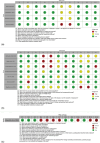Comparative outcomes of endodontically treated teeth versus dental implant-supported prostheses: a systematic review
- PMID: 40552466
- PMCID: PMC12239130
- DOI: 10.2340/aos.v84.43871
Comparative outcomes of endodontically treated teeth versus dental implant-supported prostheses: a systematic review
Abstract
Objective: The objective of this study was to compare the clinical and patient-related outcomes of root canal therapy (RCT) and dental implants (DIs) in managing severe tooth damage, supporting evidence-based treatment decisions.
Material and methods: A systematic review was performed in accordance with PRISMA (Preferred Reporting Items for Systematic Reviews and Meta-Analyses) guidelines. Six databases were searched: Cochrane Library, Embase, Medline, LILACS, Scopus, and Web of Science. Studies comparing clinical and patient-reported outcomes in adult patients treated with either RCT or DIs were included. The Joanna Briggs Institute Critical Appraisal Checklists were used to assess the risk of bias. Due to significant heterogeneity among studies, meta-analysis was not feasible, and findings were synthesised qualitatively. PROSPERO registration: CRD42024584113.
Results: Out of 1,876 initial records, 12 studies met inclusion criteria: 7 cohort studies, 4 case-control studies, and 1 randomised controlled trial. Most studies had low to moderate risk of bias. Both RCT and DIs demonstrated high survival rates, with RCT slightly outperforming DIs in terms of success. Failure rates ranged from 0.7% to 12.0%, with no significant differences between treatments. DIs were associated with a higher frequency of postoperative interventions and complications. Patient-reported outcomes such as pain, satisfaction, and quality of life (QoL) were comparable across both modalities.
Conclusion: RCT and DIs both offer viable and effective solutions for restoring severely damaged teeth, with high survival and success rates and low failure rates. Both treatments were also associated with favourable patient-reported outcomes, including minimal pain, high satisfaction, and improved QoL. The decision between treatments should consider clinical factors, patient preferences, cost, accessibility, potential complications, and patient-centred outcomes. Shared decision-making is essential for optimal patient care.
Conflict of interest statement
The authors report there are no competing interests to declare.
Figures



Similar articles
-
Survival, complications, and patient-reported outcomes of endodontically treated teeth versus dental implant-supported prostheses: A systematic review.J Prosthet Dent. 2025 Mar;133(3):669-676. doi: 10.1016/j.prosdent.2024.02.007. Epub 2024 Mar 4. J Prosthet Dent. 2025. PMID: 38443242
-
Systemic pharmacological treatments for chronic plaque psoriasis: a network meta-analysis.Cochrane Database Syst Rev. 2021 Apr 19;4(4):CD011535. doi: 10.1002/14651858.CD011535.pub4. Cochrane Database Syst Rev. 2021. Update in: Cochrane Database Syst Rev. 2022 May 23;5:CD011535. doi: 10.1002/14651858.CD011535.pub5. PMID: 33871055 Free PMC article. Updated.
-
Systemic pharmacological treatments for chronic plaque psoriasis: a network meta-analysis.Cochrane Database Syst Rev. 2017 Dec 22;12(12):CD011535. doi: 10.1002/14651858.CD011535.pub2. Cochrane Database Syst Rev. 2017. Update in: Cochrane Database Syst Rev. 2020 Jan 9;1:CD011535. doi: 10.1002/14651858.CD011535.pub3. PMID: 29271481 Free PMC article. Updated.
-
For teeth requiring endodontic treatment, what are the differences in outcomes of restored endodontically treated teeth compared to implant-supported restorations?Int J Oral Maxillofac Implants. 2007;22 Suppl:96-116. Int J Oral Maxillofac Implants. 2007. PMID: 18437793
-
Metal-free materials for fixed prosthodontic restorations.Cochrane Database Syst Rev. 2017 Dec 20;12(12):CD009606. doi: 10.1002/14651858.CD009606.pub2. Cochrane Database Syst Rev. 2017. PMID: 29261853 Free PMC article.
References
Publication types
MeSH terms
Substances
LinkOut - more resources
Full Text Sources
Miscellaneous

